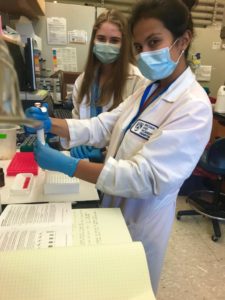Reprinted from BWH Clinical Research News October 30 2019
At Princeton University, rising sophomore Jessica Lambert found no shortage of opportunities to advance her studies and gain experience as she pursues a career in public health and indigenous studies. But as she considered her options for internships earlier this summer, one stood out above the rest: the Four Directions Summer Research Program.

.Part of the Brigham’s Center for Diversity and Inclusion, Four Directions aspires to train the next generation of Native American health care leaders through an eight-week research internship with mentoring, networking and hands-on experience at the Brigham and Harvard Medical School. The program connects students with a faculty mentor, whom they work with on a basic science or translational research project, culminating in a final project presentation.
Celebrating its 25th anniversary this year, Four Directions has trained more than 200 students to date.
Lambert, an enrolled citizen of Choctaw Nation and a first-generation descendant in the Eastern Band of Cherokee Indians, said Four Directions surpassed all her expectations — offering not only a phenomenal learning opportunity but also a rare and meaningful chance to connect with other American Indian students.
“At Princeton, I’m only one of a handful of Native students, so the sense of community this program offered made it really special,” she said. “You’re able to talk about your experiences, and everyone will know what you’re going through. There was also an incredible support system beyond the students. Everyone was so welcoming and wanted to see us succeed.”
Four Directions is open to undergraduate rising sophomores, juniors and seniors from around the U.S. In addition to research, students participate in clinical shadowing, professional development workshops, weekly discussion groups, social activities and more.
Lambert, one of eight students in this summer’s cohort, interned with Rebecca Baron, MD, of the Division of Pulmonary and Critical Care Medicine, and contributed to research about respiratory disorders. On the clinical side, she shadowed Stanley Ashley, MD, of the Division of General and Gastrointestinal Surgery, and observed a hernia repair in the Operating Room.
Through activities like these, participants gain skills, experience and knowledge they can draw from to empower themselves, their communities and future generations of all Native Americans, said Thomas Sequist, MD, MPH, director of Four Directions.
“By advancing the representation of Native Americans in medicine, biomedical science and public health, this program is an essential part of addressing both diversity and equity in these fields,” said Sequist, who is also a physician at the Phyllis Jen Center for Primary Care and chief quality and safety officer at Partners HealthCare. “In addition, our faculty and staff are exposed to cultures and viewpoints different from our own while being challenged in new and thoughtful ways. Together, it makes us all better at what we do.”
Baron, who has served as a Four Directions mentor for 20 years, said it’s a joy to welcome the students into her lab each summer.
“I have always loved participating in this program, as I feel we benefit as much, if not more, than the students do. We have the unique opportunity to learn about their background and culture, and it is inspiring to see them grow and develop in our environment,” she said. “I have longstanding relationships with many of the students whom I’ve mentored over the years, and it is a true privilege to see them thrive and to see their careers develop.”
